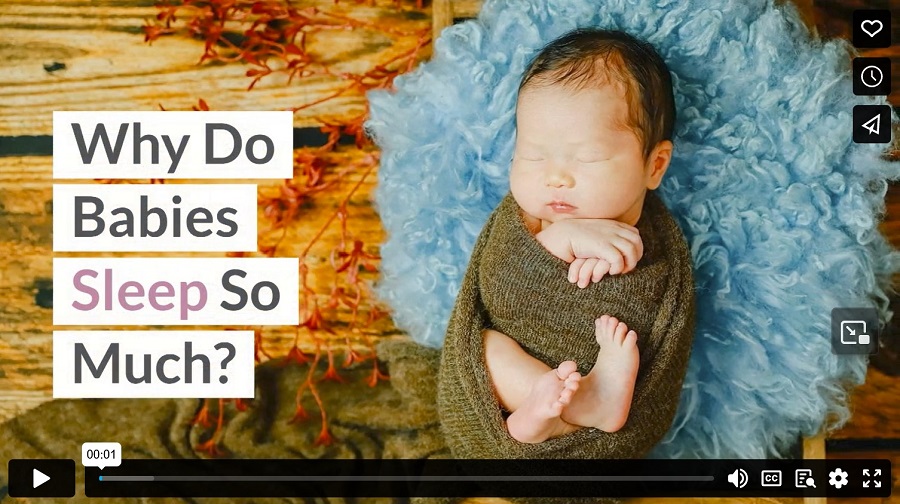It’s been a long day. You’re tired. You’re frazzled. It’s too late in the day to drink anything caffeinated, but you know that there are at least a few more hours before you can hit the hay. As you sit in the armchair holding your sleeping baby (and being secretly jealous of those zzz’s), you watch that perfect little mouth twitch into a smile, and those sleepy eyes flutter around. That must be one amazing dream to be meriting those kind gummy grins!
Even feeling the staggering exhaustion that comes with being a parent to a baby, you can’t help but cherish these moments. Holding a sleeping baby is probably as close to heaven as you can get on Earth. And in those first months of life, you get a lot of opportunities because newborns sleep ALL. THE. TIME.
In fact, a newborn can sleep up to 19 hours per day! That shifts down to 12-16 hours once a baby hits four months, and then 11-14 hours by toddlerhood. Still, that’s a lot of sleep!
Newborns are notorious for doing three things: eating, pooping, and sleeping. After a few months of life, they start to do fun things like roll, crawl, eat solid foods, and even take a few tottering steps. But those first couple months – what are they even doing that’s making them so tired??
The answer: A LOT!
Babies are little sponges that have to take in and digest a ton of brand new information all at once. Think about it: there isn’t another time in your life when every single thing you are exposed to is novel. Their brains need to process and learn that information, and sleeping is one way for them to do that.
According to the American Sleep Association, “A lot of sleep is important for newborns and is one of the most important things for growth and development.” So what kinds of things are growing and developing while a baby sleeps? Here are a few:
- Immune system: Your baby’s immune system had a little bit of a jump-start when she was developing “on the inside”, but her germ-fighting factory is still green around the ears. When your baby is sleeping, her body is learning how to ward off bugs and get used to the new atmosphere. When babies don’t get enough sleep, they tend to get sick more often or have difficulty recovering from illness.
- Brain Development: Even though your baby looks calm while she sleeps, her brain is hard at work storing memories, creating synapses, and developing tissue. It’s making connections between the left and right sides of the brain, and sending out hormones that help the rest of the body. There is also plenty of scientific evidence showing that children who get enough sleep as babies and toddlers, tend to be happier overall and do better at regulating emotions, controlling impulses, and maintaining focus as older children.
- Growth: We’ve touched on this a little bit, but it’s worth delving into a little deeper. Did you know that even though your brain produces growth hormones throughout the day, the vast majority of these hormones are produced during sleep? One study found that “growth in body length was significantly associated with increases in both total daily sleep hours as well as the number of sleep bouts.” So the better babies sleep, the better their bodies grow.
- Weight Gain: Few things are more fun that squishing chunky baby cheeks, and sleep actually contributes to how appropriately the body converts food into fat and energy, both in the short and long term. One study even concluded that children who slept less than 12 hours a day as babies are more likely to be obese as preschool-aged kids.
It’s important to note that every child is unique, and you can’t compare your baby’s sleep schedule with your neighbor’s baby’s. If your infant won’t sleep, a good place to start is to create a sleeping environment that is conducive to great sleep. Some things you can try to include are:
- Using a quiet sound machine
- Having a calm, consistent bedtime routine
- Taking a warm bath before bedtime
- Keeping the room cool and as dark as possible
- Doing infant massage right before bed
Our pediatric sleep consultants are also available to offer sleep help for kids of all ages. The Tiny Transitions team comes with tons of sleep training and personal experience under their belts to help get everyone sleeping through the night.
So when your baby is laying there, asleep, for what seems like the 75th time today, just know that they are actually hard at work. Building brain cells, converting experiences to memories, and changing milk to fat, bone, and muscle takes a lot out of a baby! So let your baby keep doing their job and get all the sleep they need.
Video



